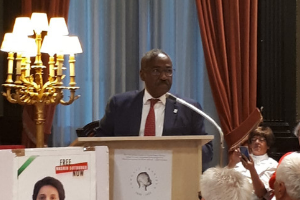The 23rd “Ludovic-Trarieux” International Human Rights Prize Awarded to Iranian Human Rights Lawyer Nasrin Sotoudeh
On May 24, 2019 in Brussels, the 23rd “Ludovic-Trarieux” International Human Rights Prize was awarded to Iranian human rights lawyer Nasrin Sotoudeh for her dedication to upholding international human rights. Ms. Sotoudeh is a human rights lawyer known worldwide for her unwavering commitment to the defence of human rights, her opposition to the death penalty and her courageous advocacy for the independence of the legal profession and the judiciary system. Notably, Sotoudeh devoted herself to the defence of young Iranian women who have been arrested and prosecuted for peacefully protesting against the compulsory veiling in Iran.
Sotoudeh was unable to accept the prize due to her imprisonment in Tehran. Sotoudeh was sentenced to a total conviction of 38 years in prison and 148 lashes stemming from seven charges, including “assembly and collusion against national security”; “spreading propaganda against the State”; and “appearing at the judiciary without the Islamic hijab.” Before her last arrest in June 2018, Sotoudeh has repeatedly suffered harassment, intimidation, imprisonment, as well as a ban on practising law, her profession.
The UIA, as a member of the “Ludovic-Trarieux” International Human Rights Prize Jury, was represented by President Issouf Baadhio in the award ceremony.
The 2018 “Ludovic-Trarieux” International Human Rights Prize and the UIA commend Nasrin Sotoudeh for her persistence and commitment to her work as a lawyer and to the independence of the legal profession, and her devoted defence of human rights.







